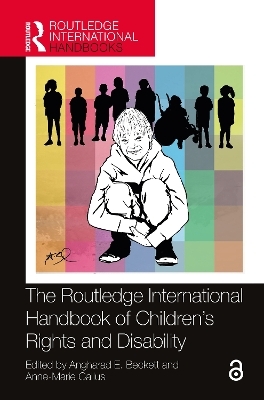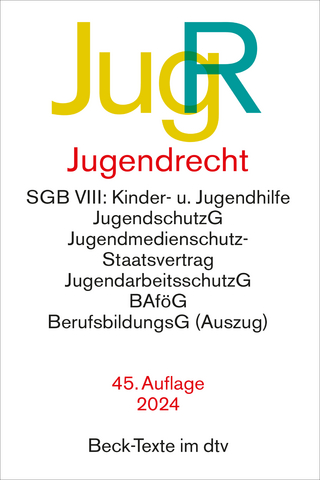
The Routledge International Handbook of Children's Rights and Disability
Routledge (Verlag)
978-0-367-52155-4 (ISBN)
- Lieferbar (Termin unbekannt)
- Versandkostenfrei innerhalb Deutschlands
- Auch auf Rechnung
- Verfügbarkeit in der Filiale vor Ort prüfen
- Artikel merken
Taking the UN Convention on the Rights of Persons with Disabilities (CRPD) and the UN Convention of the Rights of the Child (CRC) as conceptual frameworks, this work appraises the current state of affairs concerning the rights of disabled children across different stages of childhood, different life domains, and different socio-cultural contexts.
The book is divided into four sections:
Legislation and Policy
Children’s Voice
The Life Course in Childhood
Life Domains in Childhood
Comprised of 37 newly commissioned chapters featuring analyses of UN documents and case studies from Australia, Brazil, Ethiopia, Hong Kong, Italy, the Netherlands, Norway, Papua New Guinea, Serbia, South Africa, Spain, Sweden, the United Kingdom, the United States, and Vanuatu, its multidisciplinary approach reflects the complexities of the lives of disabled children and the multifarious nature of the strategies needed to ensure their rights are upheld.
It will be of interest to researchers and students working in disability studies, education, allied health, law, philosophy, play studies, social policy, and the sociology of childhood. It will also be a valuable resource for professionals/practitioners, allowing them to consider future directions for ensuring that disabled children’s rights are realised and their well-being and dignity are assured.
Angharad E. Beckett is Professor of Political Sociology and Social Inclusion and Director of Research and Innovation at the School of Sociology and Social Policy, University of Leeds. She is a member of the interdisciplinary Centre for Disability Studies at the University, where she was for many years a joint Director. Her research interests include disability theory and politics, the resistance practices of the disabled people’s movement, inclusive education, and play/leisure for disabled children and young people. She teaches Disability Studies at undergraduate and postgraduate level and has supervised many doctoral students in this field. She founded and is Co-Chair of the Editorial Executive for the open-access International Journal of Disability and Social Justice. Anne-Marie Callus is Associate Professor in the Department of Disability Studies, Faculty for Social Wellbeing, University of Malta. She lectures, researches, and has published on disability rights, empowerment of persons with intellectual disability, inclusive education and disabled children’s rights, as well as cultural representations of persons with disability. She is Deputy Editor of Disability & Society.
1.Introduction: Children’s Rights and Disability. Section One – Legislation and Policy. 2.The Human Rights Model for Children with Disabilities. Vignette One – Meet Aurora. 3.For the Full Incorporation of the Rights of Children, With or Without Disabilities, Into the Human Rights Model. 4.An Analysis of the UNCRPD Concluding Observations on the Rights of Children with Disabilities. 5.‘They still need to listen more’: Working in partnership with disabled young researchers to inform and shape country submissions to the UN Committee on the Rights of Persons with Disabilities and UN Committee on the Rights of the Child. 6.Human Rights Through the Eyes of Children with Disabilities. Vignette Two – Meet Charlie. 7.Developing the Right(s) Approach for Autism. 8.Poverty, Deprivation and Disabled Children’s Right to Citizenship. 9.The Care Dependency Grant in South Africa: Challenges on the road to inclusive rights. Section Two – Children’s Voice. 10.Children’s Rights, Arts-based Methods and Gramsci’s Common Sense: The possibilities of freedom. 11.Beyond the Spoken Word - Facilitating the disabled child’s voice through the Mosaic approach. Vignette Three – Meet Liv. 12.Disabled Children’s Participation in Healthcare Decision-Making. 13.Participation of Disabled Children in Health Guidelines Development. 14.The Right to an ‘Active Voice’ Without Words: Co-creating knowledge in special schools with Art Research Together. Vignette Four – Meet Liam. 15.The Rights of the Child When Symbolic Language is Out of Reach. 16.Do All Children Have the Right to Express Views? Listening to ‘differently-voiced’ communicators. Section Three – The Life Course in Childhood. 17.Babies with Disabilities and Their Entitlement to Imagined Hopeful Futures. 18.Is Disability a Justification to Undermine the Right to Life?. Vignette Five – Meet Ane. 19.Down Syndrome Abortion Bans: Law and ethics. 20.Clash of Competing Rights in Surrogacy: Embryos, foetuses and children with a disability. 21.Framing Does Matter: How health professionals can empower disabled children and their families. 22.From ‘Retarded’ Education to Authentic Life: A Personal Education Retrospective. Vignette Six – Meet Michaela. 23.Design as an Agent of Children's Rights? Inclusive mobility design for children with disabilities. 24.Assistive Technologies as Rights Enablers. 25.‘Look At Us…We’re Walking’: Parental advocacy v. a child’s privacy in the age of internet sharing. 26.An Open Exploration Around End-of-Life Journey’s for Children Facing Terminal Illness/Severe Disability. Section Four – Life Domains in Childhood. 27.The Changing Landscape of Inclusive Education: A shift toward universal design for learning. Vignette Seven – Meet Ġinġa. 28.‘Lawfare’ and the Role of Civil Society on Promoting the Inclusive Education Public Policy in Brazil. 29.A Certain Kind of Freedom, a Certain Subject of Right. The disability dispositif of inclusion and the government of the disabled child in the Italian education system. 30.Social Justice and Language Rights for Deaf Children. 31.Through the Eyes of Children with Disabilities: Recognising children’s agency in their play in inclusive playspaces. 32.Disabled Children’s Access to Music. Music’s transformational potential and music therapy’s dis/enabling role in making music accessible. Vignette Eight – Meet Euletta. 33.The Right to Grow Together: Exploring the roles of community agents in providing support for early adolescents with disabilities to make friends and join groups. 34.Sex, Love, and Human Rights: Sexual rights for children and youth experiencing disability. 35.Who is Worthy of Rights? An analysis of children living at the intersections of disability, citizenship and migration in the United States and Italy. 36.The Right to Safety: Promoting the authority of disabled children to tackle rights resistance. 37.Ceci n'est pas un dénouement | This is not a conclusion.
| Erscheinungsdatum | 14.04.2023 |
|---|---|
| Reihe/Serie | Routledge International Handbooks |
| Zusatzinfo | 6 Tables, black and white; 14 Line drawings, black and white; 39 Halftones, black and white; 53 Illustrations, black and white |
| Verlagsort | London |
| Sprache | englisch |
| Maße | 156 x 234 mm |
| Gewicht | 453 g |
| Themenwelt | Recht / Steuern ► Arbeits- / Sozialrecht ► Sozialrecht |
| Recht / Steuern ► EU / Internationales Recht | |
| Sozialwissenschaften ► Soziologie | |
| ISBN-10 | 0-367-52155-5 / 0367521555 |
| ISBN-13 | 978-0-367-52155-4 / 9780367521554 |
| Zustand | Neuware |
| Informationen gemäß Produktsicherheitsverordnung (GPSR) | |
| Haben Sie eine Frage zum Produkt? |
aus dem Bereich


